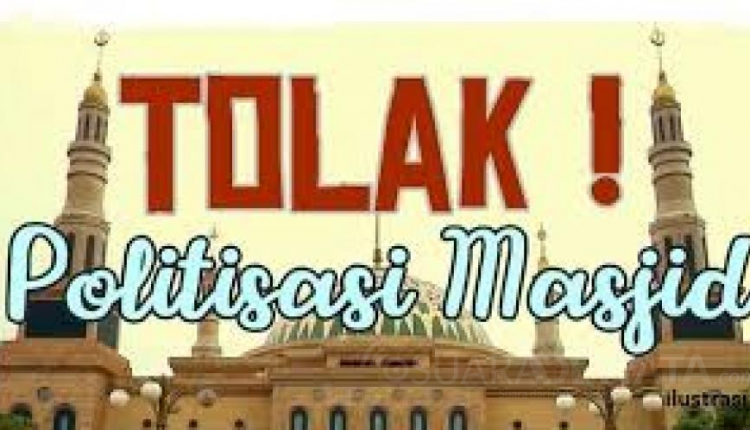Injury Election Shaped Mosque Politization
By: Yasin Nuruzzaman) *
The politicization of religion is indeed poisonous in democracy, but this cannot be denied that this political model is considered effective in winning a candidate.
The use of places of worship in the campaign proved to be cheap and efficient. This is because the voice caster does not need to lead the masses to a place.
we still remember the prayer movement of the congregation which was intensely encouraged in various cities in Indonesia, at first glance this movement deserves to be appreciated, because prayer in congregation in the mosque is a highly recommended worship, but the problem is if after the prayer prayer is performed, where the preacher or giver cultum gives destructive lectures or directs pilgrims to choose one candidate candidate.
If we look at history, activities in the mosque are not limited to worship only. At Zamah Rasulullah SAW until now, the mosque still holds the problem of the publicity of various dimensions. Muslim civilization also has a dependence on the place of worship, where the mosque becomes the central discussion of government, the strategy of war, deliberation and also education.
The Prophet Muhammad SAW made the mosque the center of control during his Caliphate. Various kinds of consensus meetings regarding publicity and nationality are generated from a gathering of worshipers in the mosque. Because it is so open, to the extent that the community plays a role in making government decisions.
The politicization of mosques does not mean voicing for Muslims to stay away from mosques, but the politicization of mosques must be rejected if the material in lectures or sermons contains material about speech utterances, or invitations to overthrow other political parties.
Ahead of the democratic party in April, we as a society must certainly be intelligent in distinguishing between politicization for the benefit of all people or politicization for the benefit of their own group.
Also important is an effort to build community political literacy. Because with qualified political literacy, it will slowly shift the discussion about the pro and anti-strongholds – certain camps are the talks that discuss public policy.
If the community has good political literacy, then self-defeating and black campaign efforts will disappear from the pulpit of the mosque. In the end, the community will focus on substantial issues about what they can get as citizens.
In this case, it is the political elite who often stirs up the emotions of the voters through the politicization of religion. Regulations with strict definitions of the politicization of religion are important to make deterrence from the elite who are immoral.
Mosques can certainly lose their warmth when political intrigue has entered the pulpit. The mosque’s sincerity will be lost if the management is filled by power brokers. Both being prone and because of ignorance.
Various forms of campaigns in mosques such as the installation of political banners or campaigns wrapped in sermons, then this is a form of coup against the house of God.
The mosque will lose its shade if the content of the sermon is interfered with by appealing to public opinion and hate speech. Pilgrims returning from the mosque bring a hardened heart. The bath was empty, only his forehead was burnt.
Maybe there are still some who ask why mosques are targeted for political activities. This has been explained by Reza Aslan as a religious observer. He said that although social media has a role in organizing the masses. But its ability is no greater than the social network that is built from activities in the mosque.
The politicization of mosques does not mean voicing for Muslims to stay away from mosques, but the politicization of mosques must be rejected if the material in lectures or sermons contains material about speech utterances, or invitations to overthrow other political parties.
The politicization of mosques is indeed not something taboo, history records that something that contains political elements departs from the place of worship. But of course there are fundamental differences. Where in the Prophet’s era the interests of the wider community were more dominant to be discussed than certain personal or group interests. That is the difference in the politicization of mosques at the time of the Prophet with the present.
It will be a problem if the political goals that the political movement strives for are political power, revile the authority of state law, overthrow the government, say to reject the Pancasila ideology, replace the state constitution or impose truth on behalf of groups to provoke other groups. If this happens, then law enforcement is clearly authorized to provide decisive action.
Political elites should have understood the rule of law that obliges to avoid harm in preaching. Although the Prophet and his companions talked about politics in the mosque, they did not make it a place for the campaign.
The politicization of mosques in fact has its own uses for the electoral actors, namely to reap the votes to bring down their political opponents through destructive doctrines.
) * The author is a sociopolitical observer
